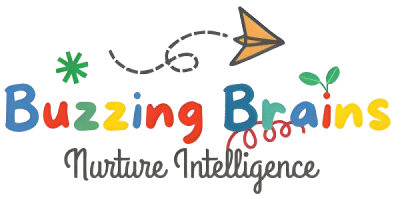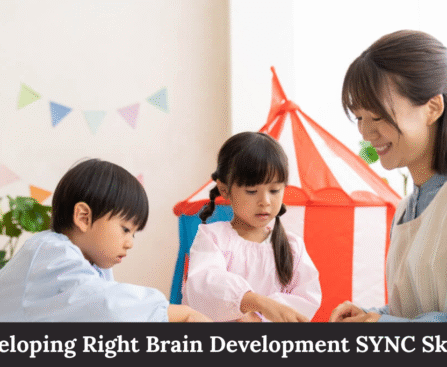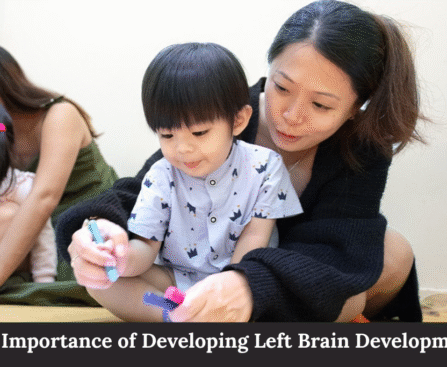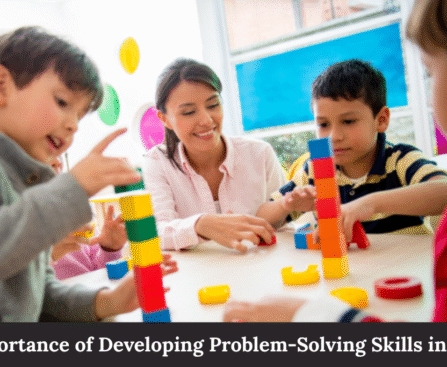As a parent, you want your child to grow into a healthy, confident, and creative individual. One crucial aspect of childhood development is Right Brain Development SYNC skills, which enable kids to think creatively, imagine, and innovate. In this article, we’ll explore the importance of developing Right Brain Development SYNC skills in kids, the repercussions of not having developed these skills, and provide tips and strategies for parents to improve Right Brain Development SYNC skills in their children. What are Right Brain Development SYNC Skills? Right Brain Development SYNC skills refer to the ability to process information in a creative, intuitive, and holistic manner. The right brain is responsible for tasks such as imagination, creativity, and spatial reasoning. When the right brain is developed and functioning effectively, kids can think more creatively, imagine, and innovate. Why is it Important to Develop Right Brain Development SYNC Skills? Developing Right Brain Development SYNC skills is crucial for kids’ cognitive development, creativity, and future careers. Here are some reasons why: Improved Creativity: Right Brain Development SYNC skills enable kids to think creatively and come up with innovative solutions to problems. Enhanced Imagination: Right Brain Development SYNC skills involve imagination, which can help kids develop their creative thinking and problem-solving skills. Better Artistic and Musical Abilities: Right Brain Development SYNC skills are essential for artistic and musical abilities, enabling kids to express themselves creatively. Increased Confidence: Mastering Right Brain Development SYNC skills can boost kids’ confidence and self-esteem, enabling them to take risks and try new things. Repercussions of Not Having Developed Right Brain Development SYNC Skills If kids don’t develop Right Brain Development SYNC skills, they may face several challenges, including: Limited Creativity: Kids who struggle with Right Brain Development SYNC skills may find it challenging to think creatively and come up with innovative solutions to problems. Poor Artistic and Musical Abilities: Right Brain Development SYNC skills are essential for artistic and musical abilities, and kids who struggle with these skills may find it challenging to express themselves creatively. Difficulty with Imagination: Kids who don’t develop Right Brain Development SYNC skills may struggle to imagine and think creatively. Effects of a Lack of Right Brain Development SYNC Skills in Different Age Groups The effects of a lack of Right Brain Development SYNC skills can vary depending on the age group: 2-5 years: Kids in this age group may struggle with basic creative skills, such as drawing or singing. 5-10 years: Kids in this age group may find it challenging to develop more complex creative skills, such as writing stories or creating art projects. 10+ years: Kids in this age group may struggle with advanced creative skills, such as designing or innovating. Games, Puzzles, and Activities to Improve Right Brain Development SYNC Skills Here are some games, puzzles, and activities that can help improve Right Brain Development SYNC skills in kids: Strategies to Improve Right Brain Development SYNC Skills in Children Here are some strategies to improve Right Brain Development SYNC skills in kids: Encourage Creativity: Encourage kids to think creatively and come up with innovative solutions to problems. Provide Opportunities for Practice: Provide opportunities for kids to practice Right Brain Development SYNC skills, such as art projects or music activities. Foster a Supportive Environment: Foster a supportive environment that encourages kids to take risks and try new things. Model Right Brain Development SYNC Skills: Model Right Brain Development SYNC skills yourself, demonstrating how to think creatively and imagine. Tips for Parents Here are some tips for parents to help improve Right Brain Development SYNC skills in their kids: Encourage Imagination: Encourage kids to use their imagination and think creatively. Provide Opportunities for Creative Expression: Provide opportunities for kids to express themselves creatively, such as through art or music. Make it Fun: Make Right Brain Development SYNC skill development fun and engaging, using games and activities that kids enjoy. Be Patient: Be patient and supportive, recognizing that Right Brain Development SYNC skill development can take time and practice. Additional Tips for Parents Here are some additional tips for parents to help improve Right Brain Development SYNC skills in their kids: Use Open-Ended Questions: Use open-ended questions to encourage kids to think creatively and come up with innovative solutions to problems. Provide Opportunities for Exploration: Provide opportunities for kids to explore and learn new things, which can help develop their creative thinking and problem-solving skills. Celebrate Creativity: Celebrate kids’ creative efforts and accomplishments, which can help build their confidence and motivation. Be a Role Model: Be a role model for creative thinking and problem-solving, demonstrating how to approach challenges in a creative and innovative way. Common Challenges and Solutions Here are some common challenges that parents may face when trying to improve Right Brain Development SYNC skills in their kids, along with some potential solutions: Lack of Time: Make time for creative activities and prioritize Right Brain Development SYNC skill development. Limited Resources: Look for free or low-cost resources in your community, such as libraries or online educational resources, that can support Right Brain Development SYNC skill development. Different Learning Styles: Recognize that kids have different learning styles and adapt your approach to meet their individual needs. The Importance of Early Intervention Early intervention is critical for kids who are struggling with Right Brain Development SYNC skills. Research shows that kids who receive early intervention and support are more likely to develop the skills they need to succeed in school and beyond. Conclusion Right Brain Development SYNC skills are essential for kids’ cognitive development, creativity, and future careers. By providing opportunities for practice, making it fun, and being a positive role model, parents can help their kids develop the Right Brain Development SYNC skills they need to succeed.
As a parent, you want your child to grow into a healthy, confident, and capable individual. One crucial aspect of childhood development is Left Brain Development SYNC skills, which enable kids to think logically, solve problems, and learn effectively. In this article, we’ll explore the importance of developing Left Brain Development SYNC skills in kids, the repercussions of not having developed these skills, and provide tips and strategies for parents to improve Left Brain Development SYNC skills in their children. What are Left Brain Development SYNC Skills? Left Brain SYNC skills refer to the ability to process information in a logical, analytical, and sequential manner. The left brain is responsible for tasks such as language processing, problem-solving, and critical thinking. When the left brain is developed and functioning effectively, kids can think more clearly, solve problems more efficiently, and learn more easily. Why is it Important to Develop Left Brain Development SYNC Skills? Developing Left Brain Development SYNC skills is crucial for kids’ cognitive development, academic success, and future careers. Here are some reasons why: Improved Problem-Solving Skills: Left Brain SYNC skills enable kids to think logically and solve problems effectively. Enhanced Critical Thinking: Left Brain Development SYNC skills involve critical thinking, which can help kids evaluate information, identify biases, and make informed decisions. Better Academic Performance: Left Brain Development SYNC skills are essential for academic success, enabling kids to understand complex concepts and apply them to real-world problems. Increased Confidence: Mastering Left Brain Development SYNC skills can boost kids’ confidence and self-esteem, enabling them to tackle new challenges with greater ease. Repercussions of Not Having Developed Left Brain Development SYNC Skills If kids don’t develop Left Brain Development SYNC skills, they may face several challenges, including: Difficulty with Problem-Solving: Kids who struggle with Left Brain Development SYNC skills may find it challenging to solve problems effectively and think critically. Poor Academic Performance: Left Brain Development SYNC skills are essential for academic success, and kids who struggle with these skills may perform poorly in school. Limited Critical Thinking: Kids who don’t develop Left Brain Development SYNC skills may struggle to think critically and make informed decisions. Effects of a Lack of Left Brain Development SYNC Skills in Different Age Groups The effects of a lack of Left Brain Development SYNC skills can vary depending on the age group: 2-5 years: Kids in this age group may struggle with basic problem-solving skills, such as sorting objects or recognizing patterns. 5-10 years: Kids in this age group may find it challenging to develop more complex problem-solving skills, such as analyzing information or identifying cause-and-effect relationships. 10+ years: Kids in this age group may struggle with advanced problem-solving skills, such as evaluating complex information or making strategic decisions. Games, Puzzles, and Activities to Improve Left Brain Development SYNC Skills Here are some games, puzzles, and activities that can help improve Left Brain Development SYNC skills in kids: Logic Games: Logic games, such as Sudoku or chess, can help kids develop problem-solving skills and think critically. Puzzles: Puzzles, such as jigsaw puzzles or brain teasers, can help kids develop problem-solving skills and think creatively. Science Experiments: Science experiments can help kids develop critical thinking skills and learn about cause-and-effect relationships. Math Games: Math games, such as math puzzles or math problems, can help kids develop problem-solving skills and think logically. Strategies to Improve Left Brain Development SYNC Skills in Children Here are some strategies to improve Left Brain SYNC skills in kids: Encourage Critical Thinking: Encourage kids to think critically and evaluate information, rather than simply accepting it at face value. Provide Opportunities for Practice: Provide opportunities for kids to practice Left Brain Development SYNC skills, such as puzzles, brain teasers, or logic games. Foster a Growth Mindset: Foster a growth mindset in kids, encouraging them to view challenges as opportunities for growth and development. Model Left Brain Development SYNC Skills: Model Left Brain Development SYNC skills yourself, demonstrating how to think critically and solve problems effectively. Tips for Parents Here are some tips for parents to help improve Left Brain Development SYNC skills in their kids: Additional Tips for Parents Here are some additional tips for parents to help improve Left Brain Development SYNC skills in their kids: Use Real-Life Examples: Use real-life examples to help kids develop Left Brain Development SYNC skills, such as solving everyday problems or making informed decisions. Encourage Active Learning: Encourage kids to engage in active learning, such as hands-on activities and experiments, which can help develop their critical thinking skills. Provide Opportunities for Reflection: Provide opportunities for kids to reflect on their learning and problem-solving processes, helping them to identify areas for improvement and develop strategies for improvement. Celebrate Successes: Celebrate kids’ successes in developing Left Brain Development SYNC skills, which can help build their confidence and motivation. Common Challenges and Solutions Here are some common challenges that parents may face when trying to improve Left Brain Development SYNC skills in their kids, along with some potential solutions: The Importance of Early Intervention Early intervention is critical for kids who are struggling with Left Brain Development SYNC skills. Research shows that kids who receive early intervention and support are more likely to develop the skills they need to succeed in school and beyond. Conclusion Left Brain SYNC skills are essential for kids’ cognitive development, academic success, and future careers. By providing opportunities for practice, making it fun, and being a positive role model, parents can help their kids develop the Left Brain Development SYNC skills they need to succeed.
As a parent, you want your child to grow into a healthy, confident, and capable individual. One crucial aspect of childhood development is problem-solving skills, which enable kids to think critically and come up with solutions to various challenges. In this article, we’ll explore the importance of developing problem-solving skills in kids, the repercussions of not having developed these skills, and provide tips and strategies for parents to improve problem-solving skills in their children. What are Problem-Solving Skills? Problem-solving skills refer to the ability to identify and resolve problems in a logical and systematic way. These skills involve critical thinking, analysis, and decision-making, and are essential for kids to navigate various challenges in their personal and academic lives. Why is it Important to Develop Problem-Solving Skills? Developing problem-solving skills is crucial for kids’ cognitive development, academic success, and future careers. Here are some reasons why: Improved Academic Performance: Problem-solving skills are essential for academic success, enabling kids to understand complex concepts and apply them to real-world problems. Enhanced Critical Thinking: Problem-solving skills involve critical thinking, which can help kids evaluate information, identify biases, and make informed decisions. Increased Confidence: Mastering problem-solving skills can boost kids’ confidence and self-esteem, enabling them to tackle new challenges with greater ease. Better Career Opportunities: Problem-solving skills are highly valued by employers, and kids who develop these skills are more likely to succeed in their future careers. Repercussions of Not Having Developed Problem-Solving Skills If kids don’t develop problem-solving skills, they may face several challenges, including: Difficulty with Academic Work: Kids who struggle with problem-solving skills may find it challenging to understand complex concepts and complete academic tasks. Low Confidence: Poor problem-solving skills can lead to low confidence and self-esteem, making kids more likely to avoid challenges and new experiences. Limited Career Opportunities: Kids who don’t develop problem-solving skills may struggle to succeed in their future careers, limiting their opportunities and potential. Effects of a Lack of Problem-Solving Skills in Different Age Groups The effects of a lack of problem-solving skills can vary depending on the age group: 2-5 years: Kids in this age group may struggle with basic problem-solving skills, such as sorting objects or resolving simple conflicts. 5-10 years: Kids in this age group may find it challenging to develop more complex problem-solving skills, such as analyzing information or identifying patterns. 10+ years: Kids in this age group may struggle with advanced problem-solving skills, such as evaluating complex information or making strategic decisions. Games, Puzzles, and Activities to Improve Problem-Solving Skills Here are some games, puzzles, and activities that can help improve problem-solving skills in kids: Puzzles: Puzzles, such as jigsaw puzzles or brain teasers, can help kids develop problem-solving skills, such as critical thinking and analysis. Board Games: Board games, such as chess or Scrabble, can help kids develop problem-solving skills, such as strategic thinking and decision-making. Science Experiments: Science experiments can help kids develop problem-solving skills, such as hypothesis testing and data analysis. Brain Games: Brain games, such as Sudoku or logic games, can help kids develop problem-solving skills, such as critical thinking and problem-solving. Strategies to Improve Problem-Solving Skills in Children Here are some strategies to improve problem-solving skills in kids: Encourage Critical Thinking: Encourage kids to think critically and evaluate information, rather than simply accepting it at face value. Provide Opportunities for Practice: Provide opportunities for kids to practice problem-solving skills, such as puzzles, brain games, or science experiments. Foster a Growth Mindset: Foster a growth mindset in kids, encouraging them to view challenges as opportunities for growth and development. Model Problem-Solving Skills: Model problem-solving skills yourself, demonstrating how to approach challenges in a logical and systematic way. Tips for Parents Here are some tips for parents to help improve problem-solving skills in their kids: Encourage Independence: Encourage kids to think independently and come up with their own solutions to problems. Provide Feedback: Provide feedback to kids on their problem-solving skills, helping them to identify areas for improvement and develop strategies for improvement. Make it Fun: Make problem-solving fun and engaging, using games and activities that kids enjoy. Be Patient: Be patient and supportive, recognizing that problem-solving skill development can take time and practice. Additional Tips for Parents Here are some additional tips for parents to help improve problem-solving skills in their kids: Use Real-Life Examples: Use real-life examples to help kids develop problem-solving skills, such as resolving conflicts or making decisions. Encourage Active Learning: Encourage kids to engage in active learning, such as hands-on activities and experiments, to help develop problem-solving skills. Provide Opportunities for Reflection: Provide opportunities for kids to reflect on their problem-solving processes, helping them to identify areas for improvement and develop strategies for improvement. Celebrate Successes: Celebrate kids’ successes in problem-solving, helping to build their confidence and motivation. Common Challenges and Solutions The Importance of Early Intervention Early intervention is critical for kids who are struggling with problem-solving skills. Research shows that kids who receive early intervention and support are more likely to develop the skills they need to succeed in school and beyond. Conclusion Problem-solving skills are essential for kids’ cognitive development, academic success, and future careers. By providing opportunities for practice, making it fun, and being a positive role model, parents can help their kids develop the problem-solving skills they need to succeed.



